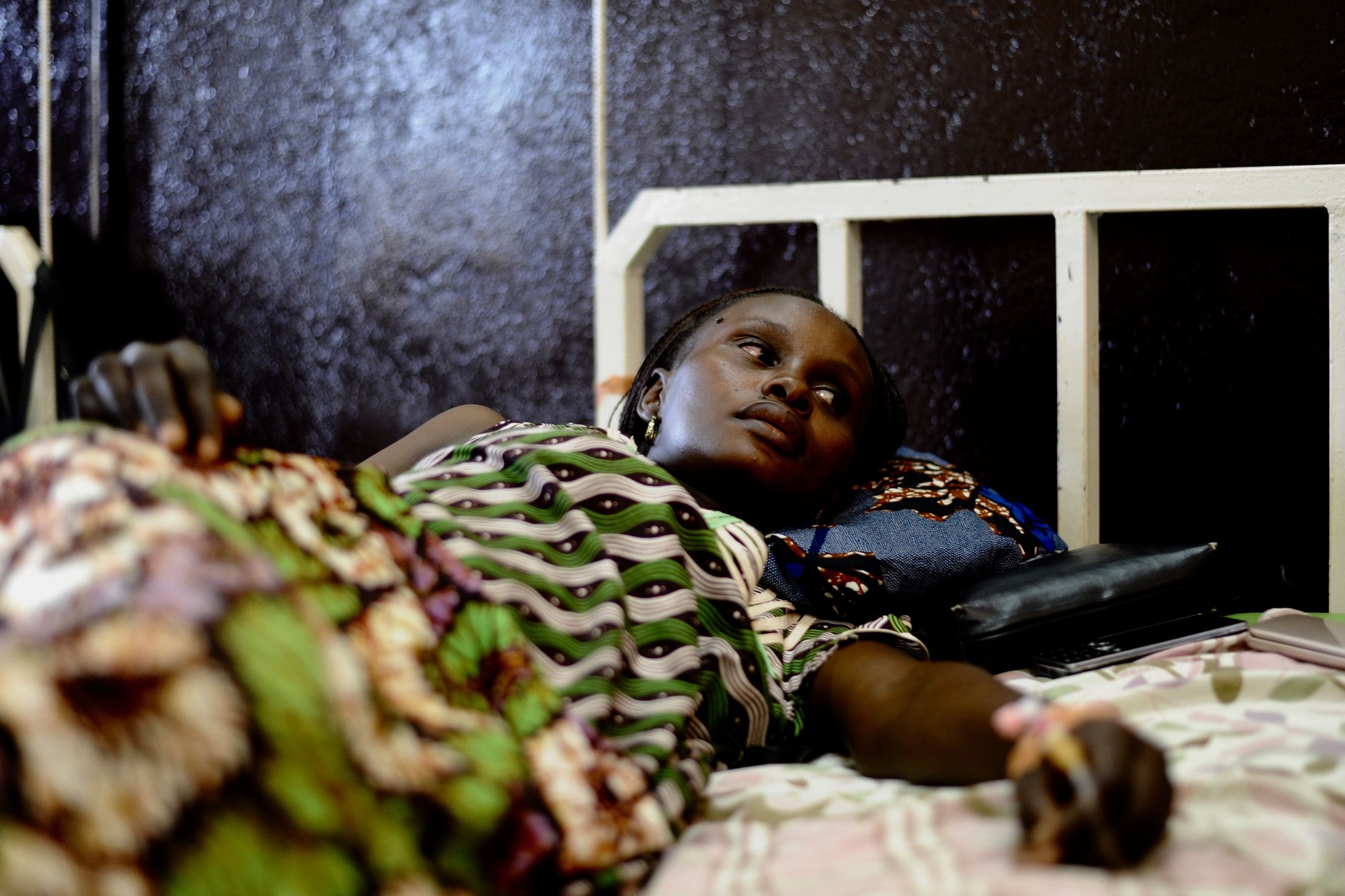HIV/AIDS
A critical situation in the
Central African Republic
A state of silent crisis

HIV/AIDS remains a leading cause of death in the Central African Republic (CAR). Last year, around 4,800 people died of HIV/AIDS, and approximately 5,500 new cases are confirmed every year in this country.
The Central African Republic is facing a particularly critical situation regarding HIV, fuelled by extreme poverty, pervasive violence, a dire lack of health facilities and staff, long-existing supply chain issues, and important barriers to early detection and care for its population
A deadly cocktail in a plagued country
“While CAR has the highest HIV prevalence across the West and Central Africa region, less than half of the estimated 110,000 people living with HIV are under antiretroviral treatment”, says Laurent Lwindi Mukota, HIV Project Medical Referent for Médecins Sans Frontières (MSF). “The situation is even more alarming for children: among those under 15 years old aware of their HIV status, less than a quarter are put on treatment.”
Ranked as the country with the lowest life expectancy in the world[2], plagued by years of conflict and insecurity, CAR is utterly dependent on insufficient external funding in its response to HIV.
Among the small number of health facilities in the country, few are offering HIV testing and care, and many persons living with HIV need to travel long and often dangerous distances to find a clinic where HIV services are available. Yet, for those able to reach such clinics, they sometimes find empty shelves instead of the needed drugs, making it impossible to continue their antiretroviral treatment.
“In a country where most people live on less than two dollars a day, financial barriers to care are exacerbating this situation”, says Marie Charlotte Bantah Sana, Head of the program against communicable diseases at the Ministry of Health and Population. “Most people need to pay to have access to an HIV test and have to pay for several extra analyses before being allowed to start the treatment. As a result, 30% of the patients who have been asked for a pre-treatment assessment in order to optimize its adherence did not come back to start the medication.”
Fidèle Marc has been working at the Bangui community hospital for two months. On November 24, 2020, the psychologist participates in an awareness session for patients in the general medical service, many of whom are HIV-positive. Credit: Adrienne Surprenant
Fidèle Marc has been working at the Bangui community hospital for two months. On November 24, 2020, the psychologist participates in an awareness session for patients in the general medical service, many of whom are HIV-positive. Credit: Adrienne Surprenant

Mathurine, 43, receives treatment at the community hospital in Bangui, Central African Republic, where MSF offers systematic HIV testing for patients.
This deadly cocktail of obstacles, combined with the termination of free testing due to lack of funds as well as poor information and stigma about the disease, largely explains why close to two-thirds of the patients are already diagnosed with advanced HIV progression when they start the antiretroviral treatment*[3].
“This is how I stumbled onto my condition”
Working closely with the Ministry of Health, MSF is the only medical organization providing medical care for patients with an advanced stage of the disease and tuberculosis co-infection in Bangui. HIV prevalence is twice as high as the national average in the capital city.
Late 2019, our teams started providing free medical care, treatment and psychological support to patients with advanced HIV at Bangui’s Centre Hospitalier Universitaire Communautaire (CHUC), while expanding its bed capacity. Collaboration through a reference system between peripheral health structures and the CHUC is currently strengthened.
One year after the start of this HIV/AIDS project, 1,851 patients had been admitted to the HIV/AIDS service, including 558 newly confirmed cases. Outside Bangui, MSF is also providing treatment for patients with advanced stage of the disease in Paoua, Carnot, Kabo and Batangafo.

Josiane, a nurse for MSF, takes care of a 42-year-old patient at the Bangui community hospital on November 25, 2020. She has had heart palpitations for a week and has been vomiting constantly for two days. Credit: Adrienne Surprenant
“I went to the hospital to accompany a relative when I started having fever and symptoms of malaria” says Reine, a 34-year-old widow and mother of two children. “During the consultation, the medical team offered me to get tested. This is how I stumbled onto my condition. I was immediately put under treatment. I had to go back to the hospital a few days ago because I got very sick again. I am now cared for and I feel better day by day”.
Anita, a mother of six, shares a similar story. « It has been a while that I feel unhealthy, but I did not know I had AIDS. I fell sick two weeks ago and was brought to the hospital to receive care. I learnt about the disease when I arrived here.”
Treatments through community groups

In order to increase access to treatment for the population, MSF teams have implemented peer-to-peer support, also known as “community ART groups” (CAG), in eight localities across the country: Bambari, Batangafo, Bossangoa, Boguila, Carnot, Kabo, Paoua and Zemio. Through this system, groups of patients living with HIV and in a stable condition designate one of their members to go get the drug refills for the coming months for the whole group, reducing transportation costs and time spent in medical consultations.
Hortense speaks with Dr Gertrude Komoyo at the Bangui community hospital on November 25, 2020. Her daughter has been in the hospital for a week. She became HIV-positive at 3 years old, when she received two blood transfusions following anemia. Once tested, she began treatment at the age of 9. Credit: Adrienne Surprenant
Hortense speaks with Dr Gertrude Komoyo at the Bangui community hospital on November 25, 2020. Her daughter has been in the hospital for a week. She became HIV-positive at 3 years old, when she received two blood transfusions following anemia. Once tested, she began treatment at the age of 9. Credit: Adrienne Surprenant
Beyond making the treatment more accessible to all, these groups also contribute to patients’ self-management and participation in the treatment and ensure peer support and treatment retention in a country where stigma against people living with HIV remains a harsh reality.
Members of these groups are key advocates of HIV prevention and have proven that a community approach is the most efficient to tackle this issue
Hands of patients, taken care of at the Bangui community hospital, November 2020. Credit: Adrienne Surprenant
Hands of patients, taken care of at the Bangui community hospital, November 2020. Credit: Adrienne Surprenant

MSf doctor Gertude Komoyo examines the leg of Mathurine at the Centre Hospitalier Universitaire Communautaire (CHUC) of Bangui, where MSF runs the advanced HIV unit.
“This system is important because some people are ashamed to go to the hospital to get their HIV treatment,” says Serge, a member of an MSF-supported CAG in Carnot.
At the end of 2020, MSF had supported the establishment of 276 CAGs, which represents approximately 2,300 HIV patients. This faster, closer community-led initiative is even more important in the context of COVID-19 in which hospitals are facing increased waiting time for consultations due to additional infection prevention and control measures to prevent the spread of this virus.
“In all projects where the CAG system has been implemented, the number of persons living with HIV who are joining these groups is constantly growing”, says Laurent Lwindi Mukota. It has also been integrated in other African countries where HIV remains a significant issue, including Mozambique, South Africa, Zimbabwe and Democratic Republic of the Congo.
Hands of patients treated at the Bangui community hospital, November 2020. Credit: Adrienne Surprenant
Hands of patients treated at the Bangui community hospital, November 2020. Credit: Adrienne Surprenant
In 2019, 6,600 persons living with HIV were under antiretroviral treatment via MSF-supported health facilities in CAR. Yet, while some progress has been made over the past decade, the collapsing health system exacerbated by years of violence, displacement and insecurity continues to put barriers to the HIV response in CAR.
There is an urgent need to increase efforts and investments to allow access to free testing and care for the Central African community.
Approximately 38 million people *[1]in the world are living with HIV/AIDS, over two-thirds of them in sub-Saharan Africa.
[1] https://www.unaids.org/en/resources/fact-sheet
[2] https://worldpopulationreview.com/countries/life-expectancy
[3] Cadre Stratégique National de Lutte Contre le VIH et le SIDA 2016-2020







